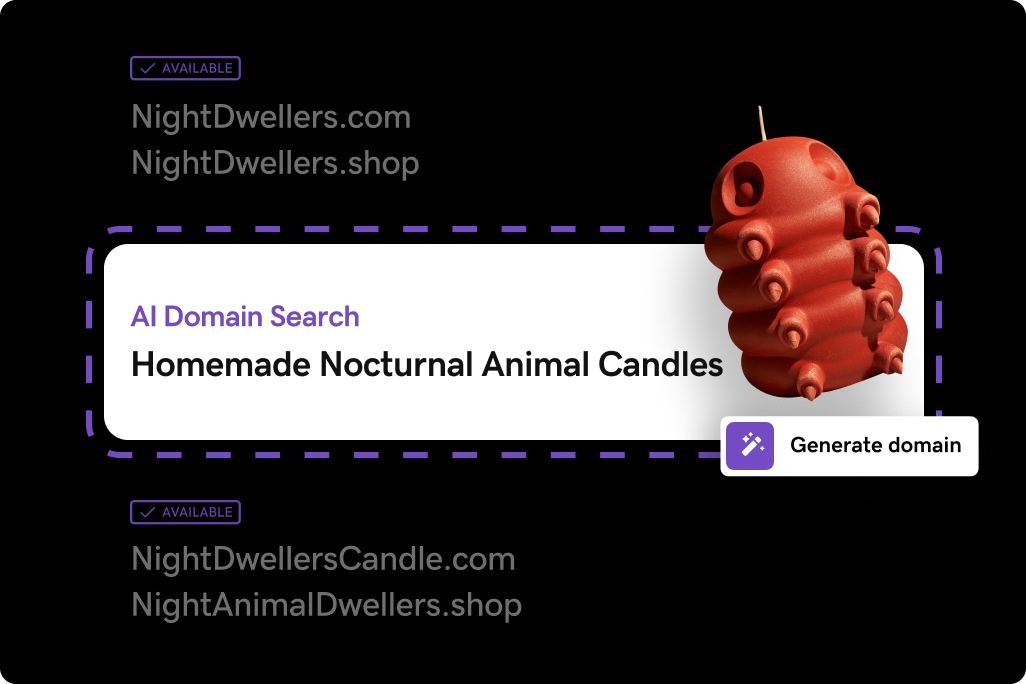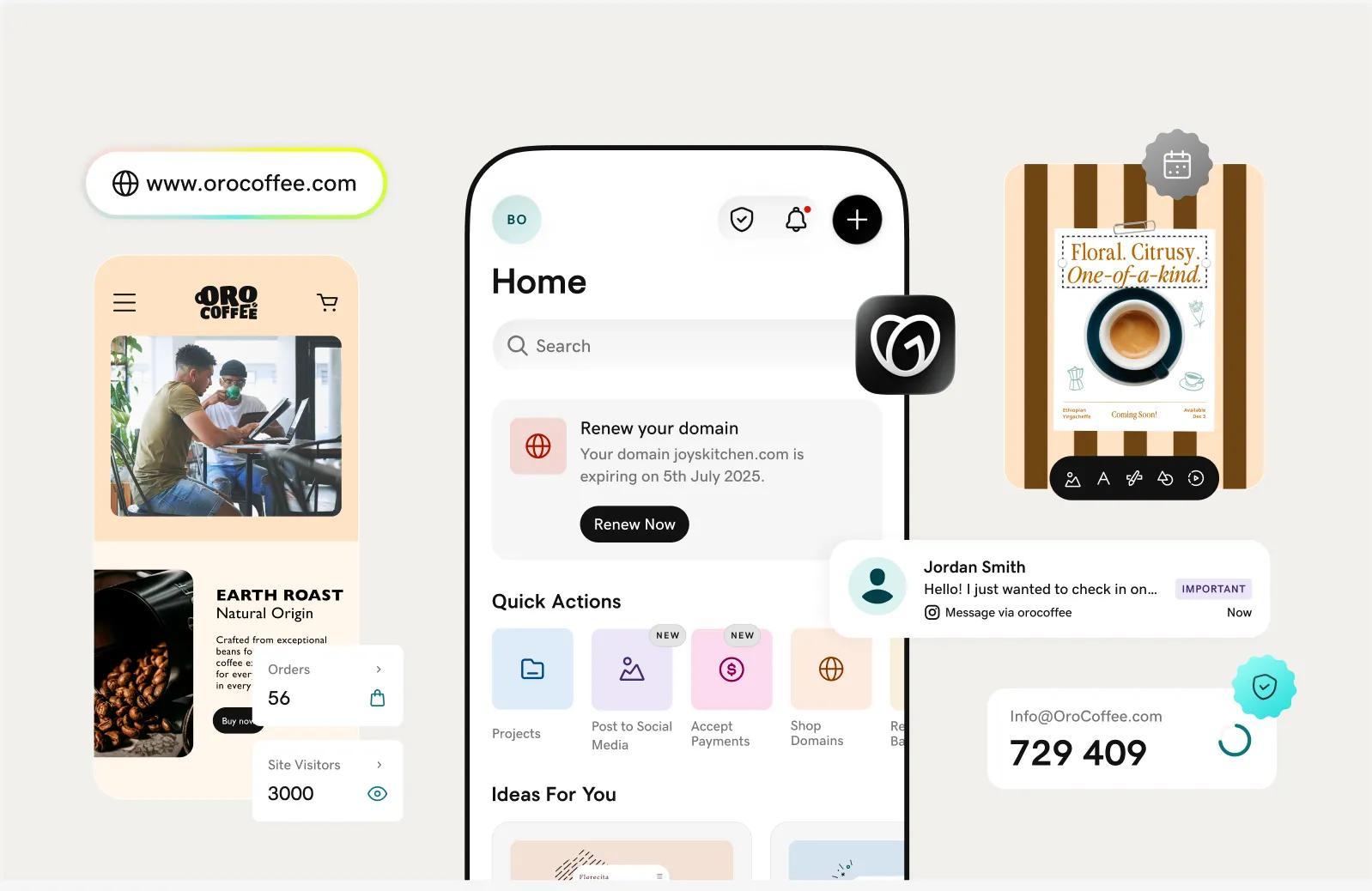Your domain extension says more about your brand than you might think. It’s the first clue visitors get about who you are, what you do, and how credible your business feels online. While .com still leads the pack in 2025, today’s domain space is full of alternatives that let you define your identity your way, like .ai for tech innovators, .store for ecommerce brands, or .co for startups ready to scale.
A domain extension is the combination of characters following the period in a web address. Before choosing the best domain name for your business, remember that it should:
- Be easy to read and remember. Avoid misspellings, numbers, or hyphens. For example, choose CoolDomainForYou.com instead of KewlDomain4U.com.
- Pick the right domain extension (TLD). Your choice may depend on your business type, industry, or what’s available. Browse GoDaddy’s domain plans and pricing to see what fits best.
- Reflect your brand. Search for domain names that include your business name, slogan, or keywords related to your niche.
Need help narrowing it down? Below, we’ll explore the most common domain extensions in 2025 and break down the differences between .com, .net, .org, and other extensions so you can choose the right fit for your website.
The domain extension may seem like a subtle decision, but it can have significant importance. It’s used to designate the category or country code for a website. For instance, in GoDaddy.com, .com is the domain extension and signifies that the website is for commercial use.
Choosing the right extension can influence everything from brand perception to search visibility. While some extensions are widely recognized and trusted, others help you stand out within your industry or target market.
The top 15 most popular domain extensions in 2025
When it comes to choosing the right domain, you should start with familiarity. Look for what domain extensions are most prevalent in your space and choose one that aligns with your brand and consumer expectations. This typically means selecting a TLD that is popular.
Here are 15 of the most common domain extensions to consider.
- .com — Most popular domain extension for any business and widely recognized
- .net — Good for tech or web-based companies since it derives from the term “network”
- .org — Popular choice for non-governmental organizations or informational websites, but not suggested for commercial use.
- .co — Newer and shorter alternative to .com and more in line with younger generations
- .us — Reserved for citizens and entities in the United States.
- .ai — Increasingly used by tech companies and startups in artificial intelligence to signal innovation and forward thinking.
- .io — Originally tied to the British Indian Ocean Territory, but now popular with software, gaming, and tech startups for its modern, digital appeal.
- .xyz — A flexible, trendy option embraced by creators, web3 projects, and businesses seeking a unique or unconventional online identity.
- .shop — Designed for ecommerce sites, this extension clearly communicates that your website is a place to browse and buy products.
- .pro — Tailored for professionals and service providers who want to highlight their expertise and credibility online.
- .store — Similar to .shop, but often preferred by retail brands looking for a clean, direct way to showcase their online storefront. Read this guide to starting an online store for more details.
- .online — A versatile choice for businesses, personal brands, or digital creators wanting to emphasize their online presence.
- .inc — A premium extension that appeals to incorporated businesses seeking a polished, authoritative domain name.
- .llc — Ideal for limited liability companies that want to reinforce their business structure and legitimacy to visitors.
- .info — Best suited for informational or educational websites where sharing knowledge or data is the primary goal
The domain extension you select has a much more important role than you might think. Let’s explore the 15 most common domain extensions and why you should consider that extension for your new website.
Your business needs a website.
1. .com
A .com domain extension is hands-down the most popular TLD available. It was originally used to designate for-profit businesses, but has now become the go-to for nearly any type of site. Because it’s so familiar, people instinctively type .com when entering a web address, which helps boost recognition and credibility.
Examples of popular .com websites include:
- Google.com
- Amazon.com
- Facebook.com
- YouTube.com
If your ideal .com is already taken, you can explore premium domain name options, purchase the domain from the current owner, or set up a domain backorder to get notified when it becomes available.
2. .net
Much like the .com extension, .net (short for network) is open to anyone. What was originally intended for internet service providers or networks has now become a popular alternative to .com websites. It’s less crowded than .com, so you’re more likely to find your desired name available. However, the .net TLD is best suited for companies with a digital or technical focus, as other industries may confuse visitors.
Some of the most popular internet brands in the world have a .net extension:
- Slideshare.net
- Behance.net
- Minecraft.net
3. .org
The .org extension was originally designed to represent not-for-profit organizations, but is now available to anyone. It’s a popular domain extension for many non-governmental organizations, nonprofits, politicians and political parties, and online communities. Because it’s one of the original TLDs, .org carries strong recognition and authority, and it’s often easier to find available names than .com. However, it’s not ideal for ecommerce or for-profit brands because users don’t typically associate .org with selling products.
Examples of well-known .org websites include:
4. .co
The .co TLD was originally designated the country code for Colombia, but has become a popular option for global domains. While it’s an interesting option in the top domain extension list, its popularity has grown in recent years.
This TLD works well for companies positioning themselves as innovative or trend-driven. It’s also more available and affordable than many premium .com domains. The only downside is that some users may accidentally type .com out of habit.
Examples of brands using .co:
5. .us
Another popular domain extension is .us. Unlike the domains above, which are open to anyone, the .us TLD is reserved for citizens and entities in the United States. You can be an individual, corporation, or nonprofit organization, but you must be a permanent resident or have your business operations prominently in the United States. It’s a great choice if your business targets U.S. customers or you want to include patriotism in your marketing, but it’s less suitable for companies with international audiences.
Examples of sites using .us:
6. .ai
The .ai TLD has quickly become a favorite among tech companies, startups, and innovators in artificial intelligence. While it originally represented the country code for Anguilla, it’s now widely recognized as a symbol of cutting-edge technology and forward thinking. This makes .ai perfect for businesses in software, robotics, or digital services.
Examples of popular .ai domains include:
Related: What is an .ai domain?
7. .io
Originally tied to the British Indian Ocean Territory, the .io TLD has evolved into a favorite among developers, SaaS companies, and gaming platforms. It feels clean and cutting-edge, making it a strong choice for digital-first brands that want to appear sleek and innovative.
A few .io domain examples are:
Related: What is an .io domain?
8. .xyz
.xyz is a creative and unconventional domain extension that appeals to brands and individuals who want to stand out. It’s popular among creators, blockchain projects, and next-generation businesses looking for something bold and memorable.
A few sites that use the .xyz TLD:
9. .shop
The .shop TLD immediately tells visitors they’re in a place to browse and buy. This TLD works great for retailers and ecommerce businesses who want to highlight their products front and center while keeping their web address short and intuitive.
.shop is used by sites like:
10. .pro
.pro is a domain extension that helps establish authority and trust. It’s a fitting choice for consultants, freelancers, doctors, lawyers, or anyone offering professional services. A .pro TLD reinforces your credibility while keeping your domain concise and polished.
Examples of .pro domains include:
11. .store
The .store TLD is designed for retail and ecommerce brands. It makes your online shop instantly recognizable and pairs well with your main .com domain to create a direct storefront. The .store TLD helps customers know exactly where to go when it’s time to buy.
Here are some .store website examples:
12. .online
As one of the most adaptable domain extensions, .online works for virtually any type of business or personal brand. It emphasizes accessibility and presence. The .online TLD is great for freelancers, startups, and organizations that operate fully on the web.
Take a look at these websites that use .online:
13. .inc
Professional, credible, and high-end, .inc is a premium domain extension built for incorporated businesses. It instantly signals legitimacy and corporate standing, making it a strong choice for established companies and startups aiming for an executive image. A .inc TLD can also improve investor and client confidence.
Some .inc examples include:
14. .llc
The .llc TLD is specifically for Limited Liability Companies. It’s a straightforward choice for small business owners who want their domain to reflect their legal structure. .llc also reinforces professionalism and transparency with potential clients.
Examples of sites using .llc:
15. .info
.info is ideal for websites focused on education, data, or resources. It signals that your content is there to inform, not sell, making it perfect for blogs, directories, and informational hubs. The .info TLD helps establish your site as a go-to source for reliable knowledge.
A few sites that use .info include:
Your ideal domain extension is waiting
There are a lot of considerations that go into picking out the perfect domain name. In addition to finding a name that reflects your personal or brand identity — and is easy to remember and type — you must also make sure the domain extension is available and aligns with your needs. If you’re looking to buy and sell a domain, the extension also matters in terms of domain value. For more on how to sell a domain, check this article.
If you’re looking to start a business and register a domain using one of the most common extensions, then you should consider GoDaddy. In addition to having a large marketplace of domains, GoDaddy has an integrated AI solution – GoDaddy Airo – that can take you from idea to online in just minutes. Choose one of their web hosting plans to host your website, set up your site with ease, and promote your business using the Digital Marketing Suite. Still searching for your perfect name? Browse GoDaddy Domain Auctions or try the Domain Name Generator.








